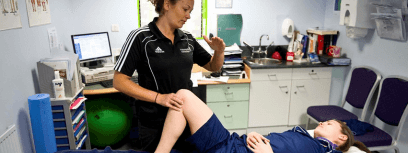How Physiotherapy Helps in Treating Functional Disorders?
Physiotherapy is necessary for all kinds of post-traumatic patients who have just been discharged from their hospitals following a short or long duration of stay. What makes this important? Well to start with, no patient wants to spend more of their time in bed without being able to carry about their daily activities or reporting to their regular jobs. The need for physiotherapy comes into existence because of this very need for self-sustenance amongst victims of accidents and adverse neurological incidents that have rendered them quite helpless on this regard and are looking for a way to regain what’s lost to them.
Neurological disorders including strokes leave the victims in a dependable state where they require a lot of time and effort to try and gain independence again to carry out even the most basic human functions. To enable this, physiotherapy and neurological rehabilitation work collaboratively focusing on specific areas of recovery as well as providing the basis for an overall mental and physical recovery from the incident. Some examples of these neurological disorders include brain injuries occurring by external accidents, strokes due to hypertension or any other reason, multiple sclerosis or MS, Parkinson’s disease that affect the overall state of the patient. Such disorders affect the functional capacity of the patients and render them incapable of leading a life even close to normal. In order to reduce this burden on the patients and not make them feel that they are obliged to their families in any manner, physiotherapy helps a great deal in this aspect. Through rigorous physiotherapy activities specifically designed to regain activities in the skeletal muscles, the functionality of the limbs is expected to return.
HOW DO NEUROLOGICAL DISORDERS AFFECT THE FUNCTIONALITY OF THE PATIENTS?
Neurological disorders, primary or secondary ones, involving the central nervous system especially take a huge toll on the patients well-being and ability to carry out their daily duties and perform tasks, even the most basic ones that they are used to doing. The central nervous system is affected, this means that the impulses that are being sent from the skeletal muscles to the brain and vice versa are not being conveyed properly to one another. The motor cortex of the brain controls the action of the limbs. The impulse from the brain reaches the limbs which respond to the command and move accordingly. When the sensory receptors present in the limbs come in contact with objects, say a hot plate, the impulse sent to the brain causes a reflex action of moving the hand away from the plate- which is an important defence mechanism, as is the ability of being able to run away from a situation- flight or respond through reaction- fight. In a nutshell, all the voluntary movements performed by a person require the strong established connection between the functional areas of the brain and the limbs through a fully healthy nervous system.
Neurological disorders that affect the limbs hence affect the basic ability of a person to move, walk or run, lift objects and carry out basic Day to day activities. Sometimes, following neurological disorders, patients lose their ability to speak and swallow normally depending on the areas affected.
HOW CAN PHYSIOTHERAPY HELP?
The role of physiotherapy in neurological disorders is to mainly try and establish or rather re-establish a connection between the brain and the limbs, evoke the ability to comprehend things and improve upon the functions of speech and safe swallowing.
There are multiple aspects of physiotherapy that play a role in the recovery and each of these are dealt with by experts in each sector.
- Depending on the age of the patient and the affliction, they may need a centre offering them the rehabilitation service on a daily or even weekly basis. Physiotherapy is necessary for such patients who will need to walk and carry about very basic day to day activities.
- Through rigorous speech and swallow therapy, the patients are trained to exercise and gain strength in their neck muscles such that they can swallow food, solid and liquid, safely without assistance. Speech therapy is inclusive of all aspects of comprehension including pronunciation and a basic understanding of fluency.
- One of the most important aspects of recovery for a patient has been through a trauma or neurological disorder is the psychological recovery from it. Expert psychologists form a crucial part of the team for physiotherapy in Hyderabad to bring the services of psychological therapy and recovery from the mental aspect of the said trauma.
- Yet another important part of physiotherapy for functional disorders is the training required to prepare the families for dealing with the patient once they have been discharged from the hospital as well as rehabilitation centres. While at the hospital or the physiotherapy centre there is always someone to constantly cater to the needs of and take care of the patients. Hence the counseling for the families play a major role in the holistic recovery of the patient.

